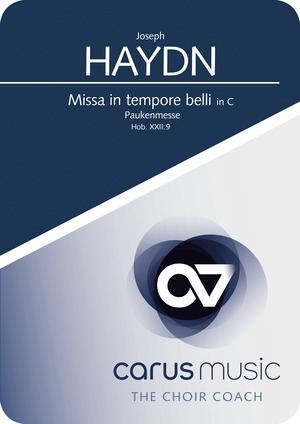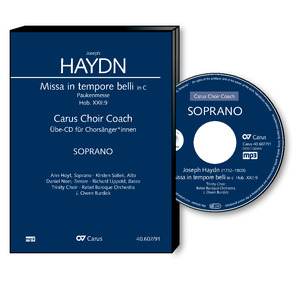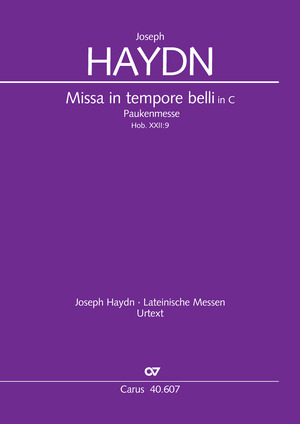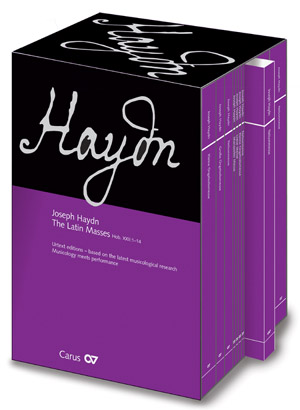
Haydn composa en 1796 sa "Missa in tempore belli", parfois nommée "Paukenmesse" (Messe aux timbales) de par la présence de timbales dans l'Agnus Dei. Cette œuvre compte parmi les dernières compositions de Haydn. Pour sa création à Vienne, Haydn ajouta à l'effectif prévu des flûtes, des clarinettes et des cors. Les solistes et le chœur devaient donc fournir un son surpassant un orchestre très puissant. Pour ce faire, le travail individuel à l'aide de l'appli carus music est bien entendu conseillé...
Interprètes: Ann Hoyt (Soprano), Kirsten Sollek (Alto), Daniel Neer (Tenor), Richard Lippold (Basse) – Trinity Church Choir, Rebel Baroque Orchestra – J. Owen Burdick
Il suffit de s'exercer. Partout. A tout moment.
Que ce soit à la maison sur votre tablette ou votre PC ou en déplacement sur votre smartphone : avec carus music, the Choir Coach, vous avez toujours vos œuvres chorales avec vous pour vous entraîner ! Avec l'application chorale de carus music, vous pouvez écouter votre partition ainsi qu'un enregistrement de première qualité sur n'importe quel appareil et vous entraîner facilement à votre propre partie de chœur avec un coach. Avec carus music, la préparation de vos concerts est facile, efficace et amusante à maîtriser !
Interprètes: Ann Hoyt (Soprano), Kirsten Sollek (Alto), Daniel Neer (Tenor), Richard Lippold (Basse) – Trinity Church Choir, Rebel Baroque Orchestra – J. Owen Burdick
Acheter
Informations complémentaires sur l'œuvre
-
Compositeur
Joseph Haydn
| 1732-1809As Kapellmeister to Prince Esterházy, Haydn composed numerous instrumental works and various operas, as well as making important contributions to the genre of church music, including fourteen Latin masses, of which only twelve are authentic or complete; these are complemented by motets and offertories, two important Te Deum settings, two Salve Reginas, a Stabat Mater, and the different versions of the Sieben Worte des Erlösers am Kreuze. The masses were composed continually between 1749 and 1802, except for the years 1783–1795, and therefore constitute the genre with which Haydn was occupied over the longest period of time. The six (authentic or complete) masses composed before 1782 are stylistically very different, and as well as short Missae breves there are more extended masses with rich orchestral scoring; by contrast the six so-called late masses, written from 1796 onwards, form a comparatively homogeneous group of more extensive works scored for large forces. With his two great oratorios Die Schöpfung (The Creation) (1798) and Die Jahreszeiten (The Seasons) (1801) Haydn established the tradition of the German oratorio for middle-class music making. Plus d'information sur la personne
-
Ensemble
Trinity Church Choir Zemun, Be
Questions fréquentes sur l'œuvre
 Il n'y a pas encore de questions et réponses concernant cette œuvre ou vous n'avez pas trouvé la réponse à votre question sur l'œuvre ? Cliquez ici et envoyez votre question spécifique à notre service clients.
Il n'y a pas encore de questions et réponses concernant cette œuvre ou vous n'avez pas trouvé la réponse à votre question sur l'œuvre ? Cliquez ici et envoyez votre question spécifique à notre service clients.






